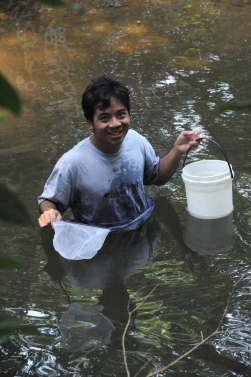Qualifying Examination
“The invasion biology of the African sharptooth catfish, Clarias gariepinus, in Southeast Asia“
Low Bi Wei
Graduate Student,
Dept. of Biological Sciences, NUS
Supervisor: Asst Prof. Darren Yeo
Co-supervisor: Dr Tan Heok Hui
Wed 27 Aug 2014: 1.00pm
DBS Conference Room II (S2 Level 3, Mezzaine)
All are welcome
Abstract – “The African sharptooth catfish, Clarias gariepinus, is a highly invasive species with known severe impacts, including native species declines through ecological (e.g. competition, predation) and genetic interactions (e.g. introgressive hybridization). The species is widely introduced and established across Southeast Asia, particularly in disturbed rural to urban environments, but despite its potential far-reaching consequences on native ecosystems, little is known about its life history and impacts in the region.
My study aims to address these knowledge gaps, and elucidate the potential risks and impacts of this invasive species on freshwater communities in Southeast Asia. Specifically, I review and analyze evidence suggesting that C. gariepinus has adversely affected populations of native Clarias species in Singapore, and address taxonomic problems in the Clarias batrachus species complex, a group that is similarly associated with anthropogenic systems, which in recent years has faced severe declines owing to uncontrolled introductions of C. gariepinus. Environmental niche models are used to investigate niche conservatism of C. gariepinus outside its native range and its invasion potential.
At the regional level, I will investigate the trophic and habitat ecology of introduced and native Clarias species in Southeast Asia, and examine the mechanisms and consequences of interspecific interactions. I will also utilize genome-wide genetic markers to elucidate the landscape genetics of C. gariepinus across the region, and determine the extent of genetic impacts on native counterparts. Besides furthering our understanding of various ecological and evolutionary processes, knowledge gained from this study will also contribute towards informing policy and management of aquatic invasive species across Southeast Asia.”